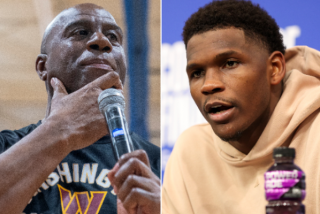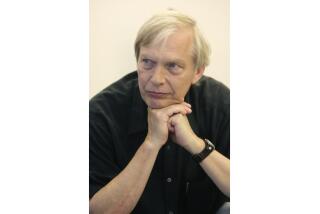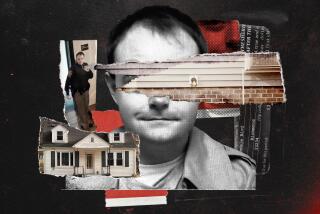Sharpened Edwards ahead in Iowa
- Share via
OTTUMWA, IOWA — The toothy grin is still there, the pile of brown hair, the talk of rich and poor, and that molasses drawl that splits words like brain -- bray-un -- in two.
But this John Edwards is more seasoned and substantive than the one who placed second in the 2004 Democratic presidential race, and less sunny.
He assails Sen. Hillary Rodham Clinton (D-N.Y.) for her early support of the war in Iraq -- Edwards renounced his war vote and apologized -- and portrays Sen. Barack Obama (D-Ill.) as just another pandering politician.
He won’t say whether he considers President Bush, at the least, a decent man. “I don’t think he’s been honest with the country about where we are now in Iraq,” Edwards said in a recent interview as he skimmed across the Iowa countryside.
Asked whether others running for president were decent people, he replied, “I’m just not going to get into evaluating everybody. I think that’s what voters should do.”
He may be running third behind Clinton and Obama nationally, but that’s better than four years ago, when Edwards was a speck in polls and “10 people at a Best Western” was a good turnout, as Ed Turlington, a veteran of that effort, recalled.
Surveys show Edwards ahead in Iowa, which holds the first vote and is a crucial momentum-builder for the rapid series of contests that follow.
“Last time, the question the campaign had to answer was: ‘John who?’ ” said Turlington, a longtime Edwards advisor. “This time there’s not only high name recognition, but a base of credibility built up from before.”
The crowds Edwards draws, though not the thousands packing Obama and Clinton rallies, are still impressive. Paying his 19th visit to Iowa in just over two years, Edwards attracted several hundred people at each stop, capped by a Saturday night crowd topping 500 in Burlington.
Edwards professes not to worry about his more-celebrated rivals. “What I’ve learned is it’s a long process,” he said with a been-there nonchalance. In two days, he rode from one end of Iowa to the other, holding five town meetings on a single subject, healthcare.
“Knowing how to do this matters,” Edwards said as he wolfed down lunch, a pair of bunless beef patties. “There’s going to be a lot of ups and downs between now and when it’s over.”
He is no longer the fresh face he was in 2004. He can’t claim a long record of political achievement. So the former senator from North Carolina is offering something else, a mix of familiarity and new thinking.
Edwards calls for “transformational change, not small baby steps.” He mocks “that crowd in Washington that needs to get out in the real world,” and urges voters -- it’s us against those durn politicians -- to challenge candidates making blue-sky promises: healthcare for all, ending poverty, erasing the deficit.
“Right,” he said to laughter from the crowd at Ottumwa’s community college. “And while they’re at it, they have a bridge in Brooklyn they’d love to sell you.”
This is a harder-edged Edwards than the candidate of four years ago. The biting tone is all the more notable given the relentlessly upbeat campaign Edwards ran last time. (Some Democrats complained he was too nice to Bush and Vice President Dick Cheney.)
The Republican National Committee issued a compendium of prickly quotes headlined, “Edwards turns to the dark side.” When he traveled to Harlem, on Clinton’s turf, to criticize congressional inaction on the war, her camp jabbed back by comparing Edwards’ assault with his repeated 2004 boasts of running a clean campaign.
But Edwards insisted his approach remained “very positive, very ideas-driven.” That said, he added: “I do think it’s important the candidates tell the truth, and sometimes people react to the truth.”
Edwards, 53, has never really stopped running for president. Just four months after the last election, he was back on the Sunday talk-show circuit, distancing himself from former running mate Sen. John F. Kerry. (People familiar with their relationship say the senator from Massachusetts feels betrayed. “I have a lot of admiration for him,” Edwards said tersely when asked about Kerry in an interview. “I like him very much.”)
Stepping down after a single Senate term, Edwards returned to North Carolina and formed an academic center to study ways of fighting poverty, the centerpiece of his 2004 bid. Some of the proposals, such as giving poor families vouchers to move to better neighborhoods and finding ways to boost savings among people of modest means, have surfaced in this presidential race.
He also traveled the world, meeting foreign leaders including Britain’s Tony Blair and Germany’s Angela Merkel, in an effort to pad one conspicuously thin part of his resume. Today, Edwards appears far more fluent on global affairs -- questions about Iran, Iraq and North Korea yield long tutorials -- than the neophyte who groped his way through foreign policy issues four years ago.
The biggest shift is his stance on the war. In 2003, Edwards was booed by Democratic activists for voting to authorize the invasion of Iraq. Back then, he minimized the issue, saying most voters would make up their minds based on other things. (In a new book, a former advisor, Robert Shrum, said he pushed Edwards to back the war for political reasons. Edwards denies any such calculation.)
Now Edwards said he was wrong -- not just about Iraq, but about its political import. When the war failed to come up, he implored Iowa audiences to ask his position, then called for withdrawing 40,000 to 50,000 U.S. troops, followed by a complete pullout within 18 months. At each stop, this drew the biggest cheers.
The war is not the only issue on which Edwards has moved left.
In the Senate, he lamented Democrats’ big-spending ways and called for greater fiscal prudence. But now he minimizes the importance of deficit reduction and proposes a universal healthcare plan that would cost up to $120 billion a year. The plan would be financed by rolling back Bush’s tax cuts and targeting loopholes that aid the wealthy.
“The president of the United States will have to make choices,” Edwards told a crowd at the Council Bluffs Senior Center. “I do not believe you can achieve universal healthcare, energy transformation and [do] the other things that need to be done in America or, for that matter, in other parts of the world, and eliminate the deficit.”
Asked in an interview what had changed, he replied: “The fundamentals have changed. The healthcare system is worse than it’s ever been. Our addiction to oil is stronger in America. The wealth gap in America has gotten worse, and those things have to be corrected.”
Edwards has worked hard to build labor support, walking picket lines, campaigning door-to-door for state minimum-wage hikes and helping union recruitment drives. He has also courted the left-leaning blogosphere, becoming the first Democrat to quit a Fox News-sponsored debate, since canceled, that drew liberal ire.
In Iowa, Edwards won high marks for his specificity on immigration, Iraq, and especially healthcare. As he repeatedly noted, he is the only candidate with a full-blown plan for universal coverage; more big policy rollouts are scheduled as part of a strategy to make Edwards the most ideas-oriented candidate in the race.
Many appreciated the detail, even when they disagreed. Dale Sullivan didn’t much care for Edwards’ stance on illegal immigration: a border crackdown along with “earned citizenship” for those already in the country. “But at least he was honest,” said the 75-year-old retired farmer, who left Ottumwa leaning toward Edwards over Obama.
However, the candor only goes so far.
Four years ago, Edwards broke a cardinal rule of presidential politics by setting public benchmarks for his performance (third or a close fourth in Iowa, third or better in New Hampshire, winning South Carolina). He has since learned better; asked about winning Iowa, he fell back on the standard demurrals.
“Shows how little sense I had,” Edwards said when his past predictions were read back to him. Then he burst out laughing.
More to Read
Get the L.A. Times Politics newsletter
Deeply reported insights into legislation, politics and policy from Sacramento, Washington and beyond. In your inbox twice per week.
You may occasionally receive promotional content from the Los Angeles Times.











